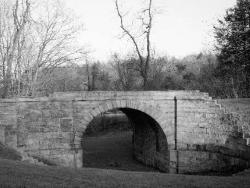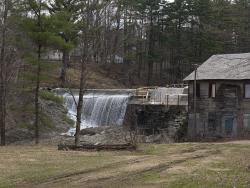1834


Ithamar A. Beard, an engineer of some prominence in New England, surveyed the mill brook and selected the best site for a storage dam. Contractor Simeon Cobb, knowledgeable of contemporary civil engineering practices, made major changes to the dam's original design, converting the linear dam into a gentle arch.

In an era when roads and canals were the most common means of overland transportation, the Allegheny Portage Railroad provided a novel alternative. The railway carried fully-loaded canal boats over the steep grades of the Allegheny Mountain. The 36-mile system rose almost 2,300 feet above sea level at its summit - the highest level to which canal boats had ever been carried. The project included ten double-tracked inclined planes, powered by steam engines. Its 900-foot Staple Bend Tunnel, cut from solid rock, was the first railroad tunnel constructed in America.
Innovations

In an era when roads and canals were the most common means of overland transportation, the Allegheny Portage Railroad provided a novel alternative. The railway carried fully-loaded canal boats over the steep grades of the Allegheny Mountain. The 36-mile system rose almost 2,300 feet above sea…
Read More
Ithamar A. Beard, an engineer of some prominence in New England, surveyed the mill brook and selected the best site for a storage dam. Contractor Simeon Cobb, knowledgeable of contemporary civil engineering practices, made major changes to the dam's original design, converting the linear dam…
Read More


